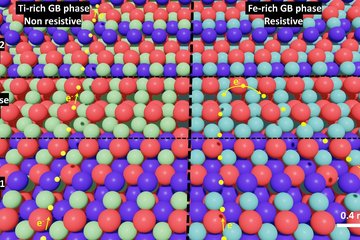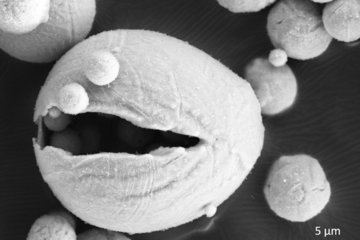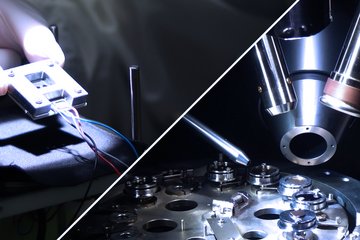All genres
281.
Talk
Operando Study on the activation of hydrogen evolution electrocatalysts. NRF-DFG meeting “Electrodes for direct sea-water splitting and microstructure based stability analyses”, Korean Institute for Energy Research, Daejeon, South Korea (2023)
282.
Talk
Sb-doping induced order to disorder transition enhances the thermal stability of NbCoSn1-xSbx half-Heusler semiconductors. The 20th International Microscopy Congress, PS-07.2. Microscopy of Semiconductor Materials and Devices, Busan, Republic of Korea (2023)
283.
Talk
New insights in energy materials by scale bridging characterization. Metallographie-Tagung, Leoben, Austria (2023)
284.
Talk
In situ TEM unveils dynamic doping behavior of thermoelectric materials – Microstructure and property evolution under heating and electric biasing. International Microscopy Conference IMC20, Busan, Korea (2023)
285.
Talk
Operando Study on the corrosion of photo-electrocatalysts. NRF-DFG meeting “Electrodes for direct sea-water splitting and microstructure based stability analyses”, Kangwon National University, Chuncheon-si, South Korea (2023)
286.
Talk
Chemistry induced phase transition at Σ7 grain boundary in Mg. Workshop on New Horizons in Materials Design, MPIE, Düsseldorf, Germany (2023)
287.
Talk
Designing the functional properties of thermoelectric materials by grain boundary engineering. Workshop on New Horizons in Materials Design, MPIE, Düsseldorf, Germany (2023)
288.
Talk
Chemistry induced phase transition at Σ7 grain boundary in Mg. PICS 2023, Marseilles, France (2023)
289.
Talk
Interfaces in renewable energy materials. BIST Symposium on Microscopy, Barcelona, Spain (2023)
290.
Talk
How can electron tomography be used for studying the catalyst degradation of fuel cells. Advanced Electron Nanoscopy Group – Institut Catala de Nanociencia I Nanotecnologia, Bellaterra, Spain (2022)
291.
Talk
In situ microstructural observation of PbTe thermoelectrics by TEM. Colloquium, Leibniz-Institut für Festkörper- und Werkstoffforschung
, Dresden, Germany (2022)
292.
Talk
Unravelling nanomorphology transformation mechanisms through advanced electron microscopy and spectroscopy analyses. MSE 2022, Darmstadt, Germany (2022)
293.
Talk
Electron microscopy insights on the mechanism of morphology/phase transformations in manganese oxides. Institut de Nanociència i Nanotecnologia (ICN2), Bellaterra, Spain (2022)
294.
Talk
Unravelling secrets of interfaces in renewable energy application. 10th International Workshop on Interfaces, Santiago de Compostela, Spain (2022)
295.
Talk
A scale bridging approach for analysis of extended defects in thermoelectric materials: From electron channeling contrast imaging, scanning transmission electron microscopy to atom probe tomography. ELMINA2022, Belgrade, Serbia (2022)
296.
Talk
Mechanism of coupled phase/morphology transformation of 2D manganese oxides through Fe galvanic exchange reaction. Chemistry Department Seminar, Kangwon National University, Chuncheon, South Korea (2022)
297.
Talk
Insight in the structure and stability of (photo)catalysts. Graduiertenkollegs GRK1896 „In situ microsopy with electrons, X-rays and scanning probes: Abschlusssymposium, Erlangen, Germany (2022)
298.
Talk
Operando study on the activation and corrosion of (photo)electrocatalysts. Colloquium, Walter Schottky Institut
, München, Germany (2022)
299.
Talk
Operando study on the activation and corrosion of (photo)electrocatalysts. Colloquium, Ludwig-Maximilians-Universität
, München, Germany (2022)
300.
Talk
Tracing impurities and structural defects in energy materials using advanced scanning transmission electron microscopy and atom probe tomography. Retreat Lotsch Group, Schloss Fürstenried, München, Germany (2022)











